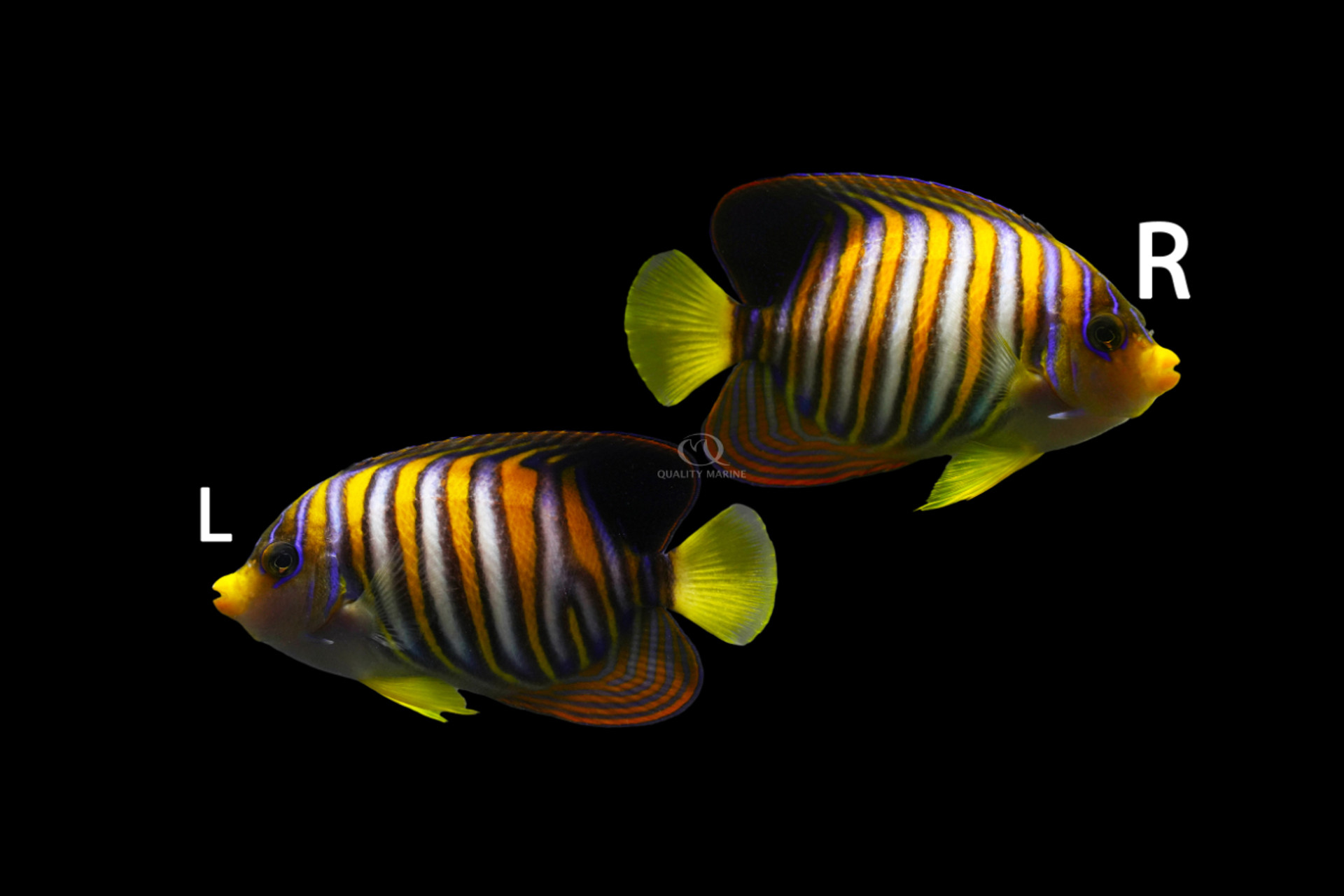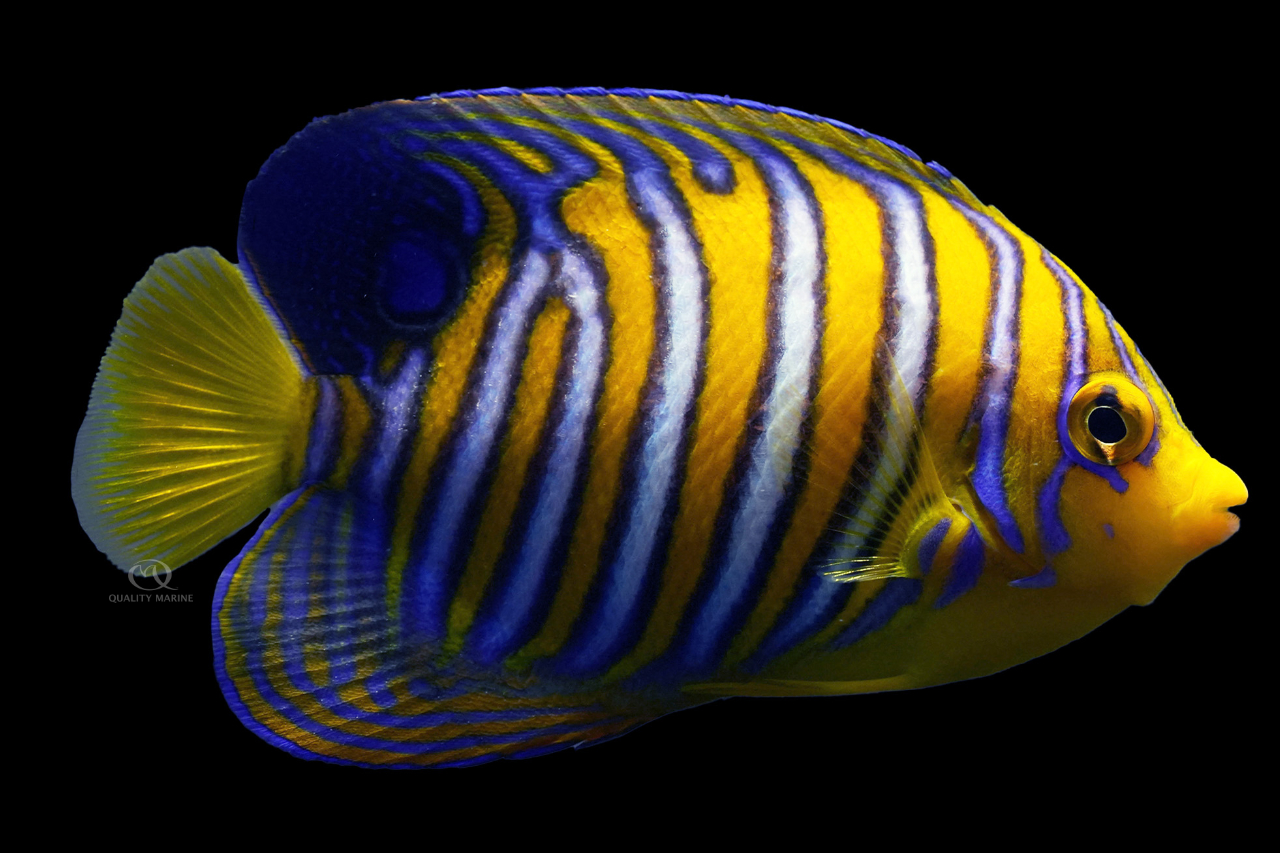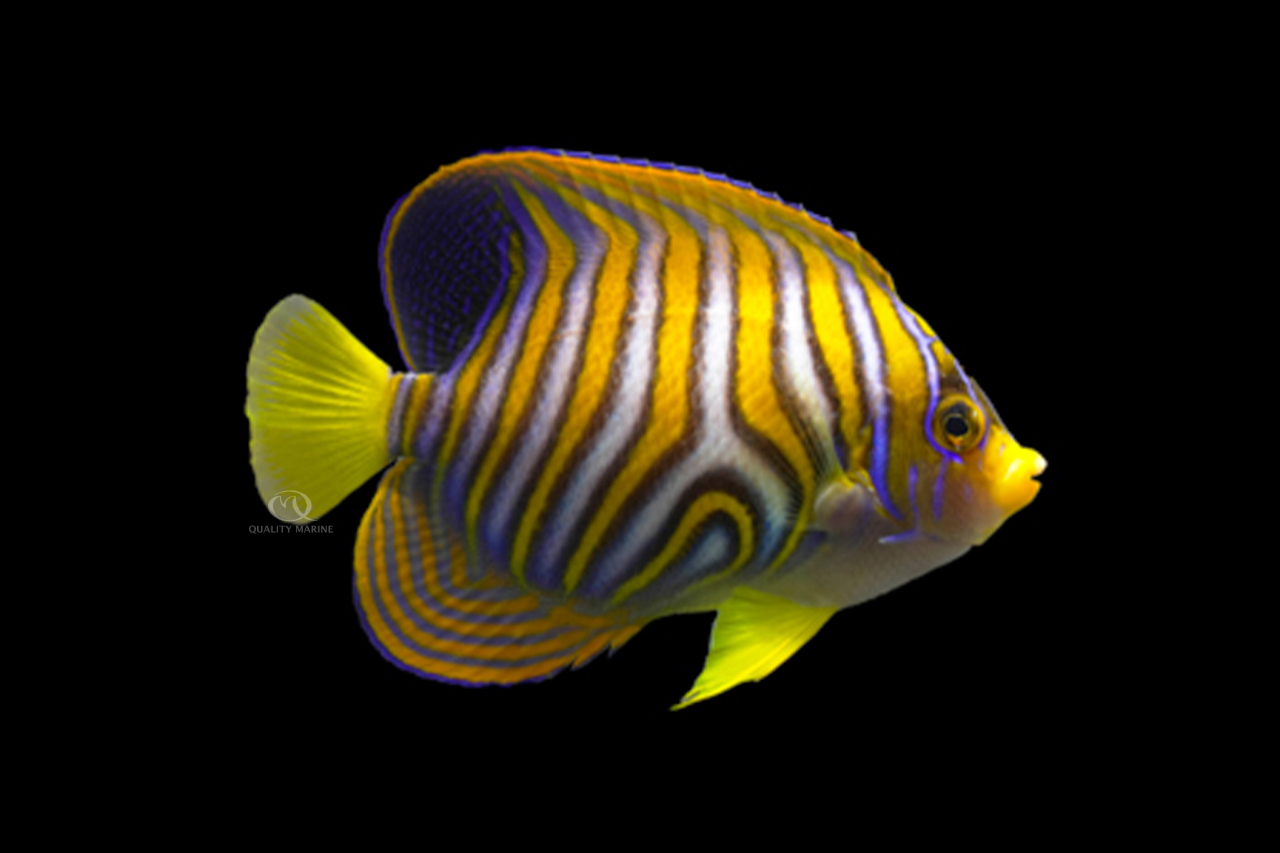The Regal Bearing of a Misbar Pygoplites diacanthus

A quick perusal of the Regal Angelfish page on our website will show you that we offer our partner stores no less than seven different “types” of Pygoplites diacanthus (the regal angels scientific name); and you can see this here: https://www.qualitymarine.com/quality-marine/fish/angels/pygoplites/. These differences are mostly down to two factors, the age of the fish and the coloration of the fish, which (mostly) has to do with were they were collected. There is however, a third factor and this is that some of them show some aberrant patterns, a missing bar, or an extra bar, or sideways pattern etc, and these get the name “Misbar” with the most extravagantly odd getting the name “Ultra” or “Ultra Misbar.”
Regal Angelfish are found throughout the shallow tropical seas of the Pacific Ocean and Indian Ocean including the Red Sea. They will have slightly different color forms based on where they are caught, with the most brilliant orange and yellow ones usually coming from the Red Sea. Regardless of where they are caught, Misbar patterns do crop up, though very rarely. In 2019, Bali Aquarich achieved a feat previously thought impossible; they bred these fish and successfully raised the offspring. Since then, they have bred the babies of that offspring and as a result, we are now able to offer our partners fully aquacultured Regal Angels on a regular basis. An added benefit of this is that the Misbar patterns seem to crop up much more regularly in this stock and while still rare, are much more commonly available!

All around the world, Regal Angelfish are best known by that name, or a close translation of it, though we occasionally see them offered as a few others like Royal Angel, Empress Angel, and Blue Banded Angel. One of our favorite translations comes from German, where Pygoplites diancanthus is usually called Pfauen Kaiserfisch, which translates roughly as Peacock Angelfish. In Malay it's sometimes called Taring Pelanduk Celak, which Google Translate has to have wrong, because they say it means Fang Moth Eyeliner.
This is one of the world's most iconic and beautiful Angels. Their wide range, common status and stunning appearance combined with a small adult size of less than ten inches long means they are harvested both as food and commonly for aquariums around the world. Adult wild Pygoplites diacanthus have a deserved reputation for adapting poorly to aquarium confines. One of the primary issues aquarists see is that Regal Angels are susceptible to poor shipping practices and long transit times. Whenever you source a fish with these qualities, it is even more important than usual to get them from a quality-first source like Quality Marine.
When developing your display for a Regal Angel, a large, well-established aquarium is a requisite. Stability of the water quality and the volume of it are both important in keeping Pygoplites healthy. Aquarists should plan for a tank of at least 125 gallons and more would be better. Normal reef tank water quality parameters are your goal. A stable pH between 8.0 and 8.4, no ammonia or nitrite, nitrates less than 5ppm, specific gravity steady within a thousandth of 1.026 and a stable temperature somewhere between 72- and 78-degrees Fahrenheit. These exact parameters are of less importance if you opt for aquacultured specimens, though stability in a large established aquarium is a requirement that is a standard across the board.

Plan your displays with plenty of rocks for your fish to graze on, swim through and hide within. This will lower your new pet's stress, make them bolder and help to give them natural foods to consume. We've seen plenty of people say they've kept juveniles of the species in displays that have a variety of corals, but we've seen just as many say later that this ended badly. This is a fish that is so beautiful, it doesn't need a coral heavy background, and we don't recommend them for reef tanks. If you are dead set on trying this, try them with fast growing corals that can take the stress of being nibbled on and feed them very well. Aquacultured specimens may be less likely to take your prize SPS down as a midnight snack, but it's possible they will anyway.
In regard to other tankmates, Regal Angels are among the more peaceful angels you will run across. They can be kept with all but the most docile fish, and the most aggressive ones. As your Angel grows it will be more likely to develop a territory and as such may be less likely to co-habit with fish that have a similar body shape. If you plan on having multiple Angels, it is usually best to add them all as juveniles and at the same time so they can develop relationships over time.
Aquacultured Regal Angels are great eaters and usually come totally willing to take prepared foods. We like to use Nutramar's Algae and Color Boost Shots to give them something to graze on. This is a great food for them nutritionally and allows them a very natural feeding behavior. We supplement this food a mix of Nutramar Pellets, and thawed meaty foods from Gamma including mysis, spirulina loaded brine, chopped mussel and prawn. This a good mix for both cultured and wild fish, in addition, both wild and cultured should get food to round out their nutritional needs like the Cockle in Shell product (a natural food for them) and the Vegetarian Diet both from Gamma. In the wild, these fish will graze on algae and sponges, and it's important to get a good amount of this into their diet with things like the Nutramar Nori and Ogo.
Misbar Regal Angels are the ultimate showpiece for a home marine aquarium, they have few rivals for beauty and activity. Whether you're an expert aquarist with a large display, ready for the challenge of a wild caught specimen, or an experienced aquarist looking for the coolest aquacultured fish money can buy, Quality Marine has the right Pygoplites diacanthus for your tank. If you're ready, head to your Local Fish Store and ask for one from QM today!